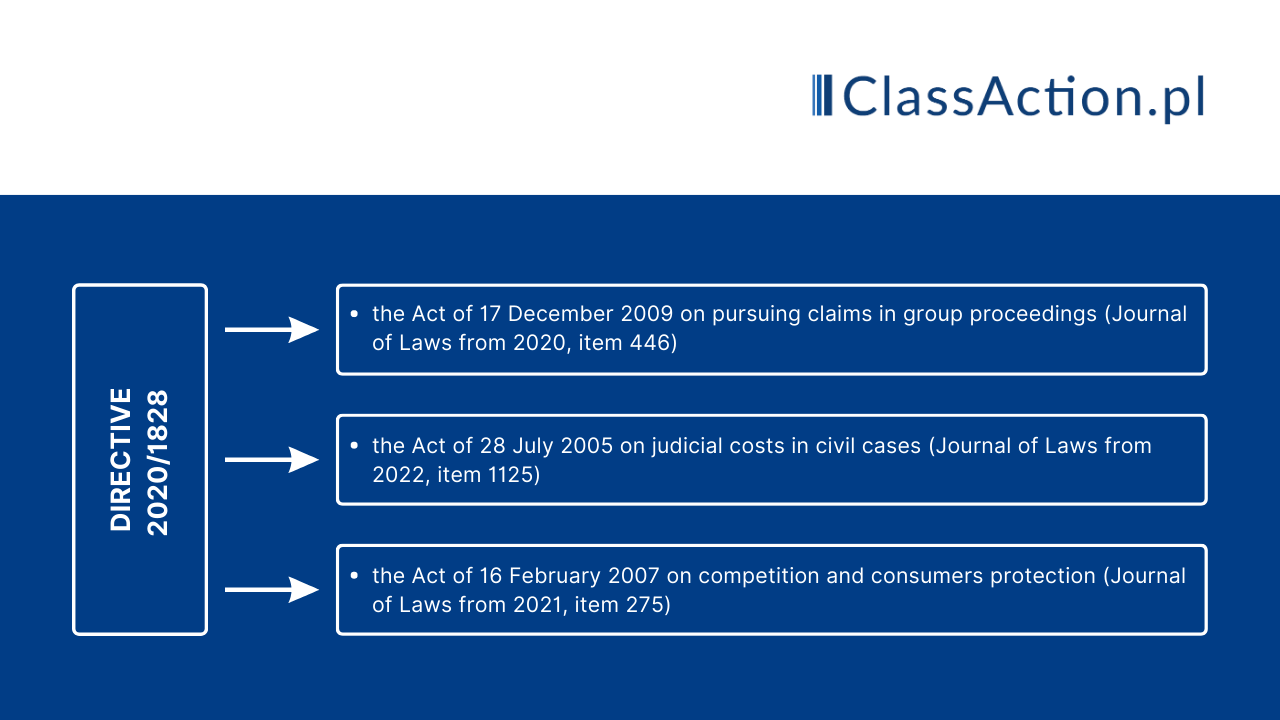Draft of the act implementing Directive 2020/1828 on representative actions
 Agnieszka Trzaska-Śmieszek
Agnieszka Trzaska-Śmieszek Magdalena Osmęda
Magdalena Osmęda
22 March 2023
The draft of the Act on Amendments to the Act on Pursuing Claims in Group Proceedings and Certain Other Laws, dated on 6th December 2022 (hereinafter: “Draft of 6 December 2022“), is proceeded at the Government Legislation Center. The President of the Office of Competition and Consumer Protection is responsible for the draft. Currently, the procedure is at the opinion stage. According to the information made available by the Government Legislation Center, substantive comments to the draft have been submitted by the Financial Ombudsman, the Ombudsman for Small and Medium Enterprises and the First President of the Supreme Court.
Implementation of the Directive 2020/1828
The Draft of 6 December 2022 is projected to implement into the Polish law the Directive of the European Parliament and of the Council (EU) 2020/1828 of 25th November 2020 on representative actions for the protection of the collective interests of consumers and repealing Directive 2009/22/EC (hereinafter: “Directive 2020/1828“) – which is a part of a package of directives creating the so-called new deal for consumers.
|
The major aim of the Directive 2020/1828 is to guarantee a high level of consumers protection by upgrading mechanisms for the protection of the collective consumers interests; this aim shall be achieved by providing consumers with at least one effective and efficient procedural mechanism in the form of a representative action at EU and national level in all Member States; a representative action is an action brought on behalf of a group of consumers for injunctive measures and redress measures. Such an action shall enable the discontinuation of a national or cross-border unlawful trader’s practice or application of a redress measure. As it is explained in the recitals of Directive 2020/1828, the need for harmonized regulation of representative actions within the EU results from the increasing risk of violation of consumer interests due to globalization and digitalization processes. The increasing dynamics of trade (including cross-border trade) generates an increased risk of violation of consumer interests.
|
A new “tool” for consumers
The Draft of 6 December 2022 gives consumers a new “tool” to fight against traders using unlawful practices – representative action – in the “Polish version” group proceedings; however, the Draft of 6 December 2022 provides for the introduction of a number of solutions for the benefit of consumers in the regulation of group proceedings itself, including the regulations of admissibility of group proceedings and the course of the group proceedings, as well as the introduction of sanctions and obligations that may be imposed on the trader – in the proceedings for the discontinuation of practices violating the interests of a group of consumers or for claims related to the application of such practices.
In particular, the Draft of 6 December 2022 provides for a modification of the premise of the size of the group by stipulating the exception from the requirement to seek claims for the benefit of at least 10 group members, introduces the admissibility of joining the group (in a specific case) until the conclusion of proceedings at first instance, and introduces an exemption from court costs for the group representative (qualified entity), although the latter solution is criticized. More information on the specific changes is presented further below.

The Draft of 6 December 2022 assumes the implementation of Directive 2020/1828 through amendments to three legal acts:
- the Act of 17 December 2009 on pursuing claims in group proceedings (Journal of Laws from 2020, item 446; hereinafter: “PCGP“)
- the Act of 28 July 2005 on judicial costs in civil cases (Journal of Laws from 2022, item 1125; hereinafter: “JCCC“)
- the Act of 16 February 2007 on competition and consumers protection (Journal of Laws from 2021, item 275; hereinafter: “CCP“).

Member states were obliged to introduce regulations implementing Directive 2020/1828 by 25th December 2022; regulations implementing Directive 2020/1828 shall be applied as of 25th June 2023, for violations that occur on 25th June 2023 or after that date. The deadline for implementation of the Directive 2020/1828 has not been met; however, the Draft of 6 December 2022 assumes that the amendments will enter into force on 25th June 2023.
The most significant amendments on group proceedings
The most significant amendments in the Draft of 6 December 2022 regarding the regulations of the PCGP, are:
1. Amendment of the requirement for admissibility of the group proceedings
- extension of the material scope of the PCGP (amendment of Article 1.2 of the PCGP) by explicitly stating that the PCGP applies “also in cases for the discontinuation of the practices that infringe the interests of group of consumers or claims relating to application of such practices”;
- exclusion of the requirement of a numerosity of the group containing at least 10 persons “in group proceedings for discontinuation of practices that infringe the interests of group of consumers” by adding paragraph 4 to Article 1 of the PCGP;
- introduction of an additional premiss of the rejection of the statement of claim – in case when the court determines that the funding of a qualified entity by another entity has an impact on ensuring that the interests of consumers are adequately protected in a pending group proceedings (see drafted Article 10c);
2. Exclusive legal standing of qualified entity and its privileged position
- the Draft provides for granting exclusive standing to bring a class action in cases for the discontinuation of practices that violate the interests of a group of consumers and for claims related to the application of practices that violate the interests of a group of consumers – to a so-called “qualified entity” the definition of which will be set forth in Article 46a of the CCP (“qualified entity” will be defined as a consumer organization entered in the register of qualified entities after meeting the requirements set forth in the CCP); only the qualified entity will be entitled to be a group representative in the above-mentioned cases (see drafted Articles 1b and 2a);
- according to the drafted Article 96.1 pt. 7a JCCC, the qualified entity will be exempted from the obligation to pay judical costs and will be entitled to charge fees for joining the group in the amount of no more than 5% of the claim (see drafted Article 5c);
3. Other distinctiveness of group proceedings for discontinuation of practices that infringe the interests of a group of consumers:
- an obligation to call upon the trader, before bringing an action, to discontinue thepractices, within 14 days from the service of the summons (see drafted Article 4b);
- the obligation to obtain (and attach to the statement of claim) the opinion of the President of the Office of Competition and Consumer Protection (the issuance of the opinion will be regulated in Article 46c of the CCP) (see drafted Article 6.4 and 6.5);
- binding effect – in group proceedings – of a final judgement finding that the practices violated the interests of a group of consumers, or final decision of the President of the Office of Competition and Consumer Protection finding that the practices violated the collective interests of consumers (see drafted Article 6a);
- mandatory suspension of the group proceedings in cases stipulated in drafted Article 10d (suspension related to proceedings conducted by the President of the Office of Competition and Consumer Protection);
- the possibility to join the group (submit a declaration of joining the group) by a person who, prior to the date of commencement of a group proceeding, has brought an action against the defendant for a claim that may be included in the group proceedings – until the date of conclusion of the proceedings at first instance (see drafted Article 13.3);
- the possibility to leave the group by a group member who disagrees with the terms of a settlement reached in a case involving claims related to practices that violate the group interests of consumers (see drafted Article 19a);
- the possibility to oblige a trader to inform consumers covered by a claim about a final court decision or a settlement (see drafted Article 21a);
- the introduction of a fine (imposed on the trader) in the amount equivalent to EURO 10,000 for each day of delay in the event of failure to comply with a judgment issued in a case for the discontinuation of practices that violate the interests of a group of consumers (see drafted Article 23a); a fine in the same amount may also be imposed on the trader in the event of evasion of compliance with an order to disclose or release means of evidence (see drafted Article 23b).
- exclusion of the application of Articles 8 and 9 of the PCGP (provisions on security deposits for legal costs) when the claimant is a qualified entity (see drafted Article 9a).
The Draft of 6 December 2022 is the subject of a lively discussion during public consultations and some of drafted regulations are doubtful and controversial.
We will monitor the progress of the legislative process and keep you updated on our blog. We will also provide our more exhaustive analysis of the drafted regulations soon.
 Agnieszka Trzaska-Śmieszek
Agnieszka Trzaska-Śmieszek Magdalena Osmęda
Magdalena Osmęda
